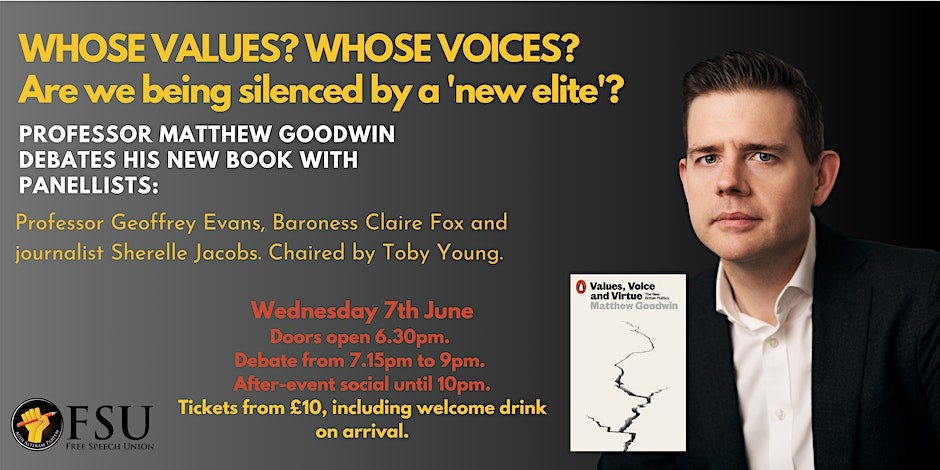Inside The Lords - pedestrianisation, porn and pushing back on censorship
Claire Fox reports from a week in the House of Lords, including a win for free speech in defence of Baroness Falkner.
Inside The Lords will be my last for a week - we’re about to go on recess. But before I go off to plan the Battle of Ideas festival during our break, let me tell you what’s been going on.
While discussing the Levelling Up Bill, we looked at pedestrianised areas and what changes they make to high streets - something that many of my fellow Lords agreed is a tricky issue with pros and cons. But once I raised the question of LTNs - particularly the one in Oxford which has allegedly resulted in the closure of several restaurants and cafes - there was silence in the chamber. When licensing came up, with cafes being able to host customers out on the street, an amendment cropped up attempting to ban people from smoking alongside their coffees. Like the LTNs, once I spoke up in favour of smoking, I was met with silence.
We recorded Inside The Lords this week following an in-depth meeting at the Academy of Ideas on what issues we’ll cover in this year’s festival - including how to handle the question of immigration. If only the discussion in the Lords was so nuanced. During a debate on the Illegal Migration Bill, we talked about whether international treaties were being breached by the government’s plans on stopping small boats. When I raised the question of whether international law was being used to stymy democratic lawmaking by the government, it didn’t go down well. But I also wanted to point out the hypocrisy in this objection on treaties - the Online Safety Bill breaches a variety of treaties on freedom of conscience, privacy and even free speech. None of the members of the House of Lords ever cites these when we’re discussing the issues of that Bill.
Speaking of the Online Safety Bill, we had a rather unfortunate event in the chamber. While discussing some of the issues related to pornographic content available to children, some of my fellow Lords went into rather graphic detail. What we hadn’t realised is that a group of 10-year-olds had been visiting, and listening, in the viewing balcony above. After they were hurriedly ushered out, another round of discussion ensued with even more detailed horrors (this time discussing avatars abusing each other) upon which we found out an even younger group of kids had been having their turn visiting the chamber. Oops - but on a serious note, the most depressing part of the day’s discussion was that Lords seemed to be unable to view AI and virtual innovation as anything other than a threat and a danger, rather than thinking about what we might do to harness it for good.
Some good news. After we filmed Inside The Lords this week, my phone pinged and I found out that the EHRC had suspended its investigation into Baroness Falkner - something I mentioned in one of my speeches this week. For the crime of clarifying the law on the basis of facts about sex and gender, Falkner received an onslaught of accusations of bullying and harassment. I was involved in a letter of support, signed by 54 cross-party peers, claiming that Falkner was being attacked wrongfully, and that the ability to speak freely about biological reality was being threatened. It seems it worked. So perhaps that is proof that there is space for some pushback on the toxicity of the trans debate, even in the House of Lords.
Outside the Lords, as I said, we’re full steam ahead for the Battle of Ideas festival. If you haven’t booked your tickets yet, do so soon to take advantage of our Super Earlybird rates. But we’d also like to press you to subscribe to our Substack if you’re reading this as a stranger to us - and get your friends to do the same. We need you in the fight for freedom, in order to reshape the challenges we face to change politics for good.
I will be speaking at this event organised by the Free Speech Union on the 7 June, get your tickets here.
Some updates on my interventions during the Online Safety Bill this week…
My defence of press freedom against a Lib Dem attempt at bringing in state licensing through the back door. But also, descriptions from Lords of comments sections in newspapers betrayed a contemptuous view of the public as mainly hate-fuelled bigots. My counter response was to use an example of Stop Funding Hate, who arguably whipped up hate against gender-critical female athletes while organising a censorious press boycott.
One worry about the Online Safety Bill beyond free speech is the danger it poses to innovation in technology. The Bill only sees the worst on - for example - AI / VR / Metaverse, and can sound as though we should treat all online users as though they are dangerous deviants. So I argued for some balance and proportionality, please.
In the Online Safety Bill, I raised the issue of Mizzy - is Tik Tok the problem, or a failure of police and adults intervening? But also, we need to think about the danger of encouraging platforms to call police for what others label hate speech/harassment (but is often more complicated). For example, Kishwer Falkner, head of EHRC, has been accused of harassment - but these are more likely malicious and vexatious accusations due to her clarification of Equality Law, making clear it refers to biological not any self-described identity.
Agreeing with those calling for more transparency in the online world. If Big Tech have a policy of de-boosting, removal etc, we want to know how and why it happens (ie - set it out clearly, with no gobbledegook).


